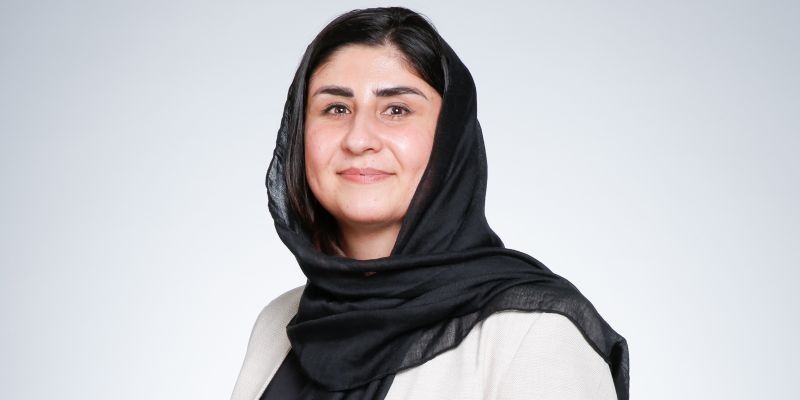
An academic who left his home country of Afghanistan with his wife and young daughter to pursue a new life in the UK has hailed the support from the CARA fellowship as “a window of hope”.
Mustafa Mohammadi, 32, was connected with the University of Leeds through the CARA (Council for At Risk Academics) fellowship, after the University he worked at in Bamyan, central Afghanistan, was closed when the Taliban seized control of the country in 2021.
He said: “If you live in a country where there is a conflict, there is fear. You are dealing with hopelessness; losing your job, not having a sustainable family income - and then you get this opportunity of being a CARA fellow. It’s a window of hope that opens at a time that you are stuck with a lot of chaos.
“It gives you an opportunity to go out there and follow your dreams – get a PhD, get professional in your area of expertise, start a whole new life in a country where you are safe.
“Having a daughter in Afghanistan is really hard. Hard in terms of how society behaves, and it’s very limited in the opportunities you can present your children with.
“Living in the UK, you have this opportunity for your wife to grow and flourish, you have this opportunity for your daughter to start school. And you have a future you can dream about for your daughter.”
Sanctuary status
Mustafa spoke about his personal experience as the University of Leeds was awarded University of Sanctuary status, a testament to its ongoing efforts to provide a welcoming environment for refugees and asylum seekers displaced through devastating crises across the globe.
The University’s sanctuary work is embedded in the local community, working closely with partner organisations including Leeds City Council and third sector community groups.
Sanctuary fellow Mustafa, who is now working on his PhD in Information Management at Leeds University Business School, talked about the importance of freedom of speech as an academic – and how sanctuary gave him the freedom to speak and write about the things that matter to him.
He said the University of Sanctuary award was a “platform for change”.
Multicultural Leeds
“Sanctuary is a value to me, a humanistic commitment of an organisation. It’s not about financial commitment,” he said
“It’s about a commitment to the broader value that we are all working towards. Giving voice to people who are at risk, like me – a scholar at risk.
“Access to education is still systematically being denied across the world. The support that was offered to us from the University of Leeds and Cara is huge.”
He said that his family are happy in multicultural Leeds, itself a City of Sanctuary, and full of welcoming people.
He is due to complete his PhD in 2026 and wants to stay in the UK to pursue his academic career and plan for a safer future with his family. Mustafa added: “I can think now what I want for my daughter’s future – and my wife’s. My wife is working really hard on her language skills, to take on a British accent – and getting used to a Yorkshire accent!”

Academic Kawita Sarwari was forced to flee her home and family in Afghanistan when the Taliban regime banned women from education after regaining power in 2021.
Kawita, who has found a new home in Leeds and is studying for her PhD in the School of Education, said: “The support I’ve received from CARA and the University has had a profound and lasting impact on me – personally, professionally and emotionally. They didn’t just offer me a placement, they helped restore my identity, my dignity and my future.
“When I learned Leeds was awarded University of Sanctuary status, I felt deeply moved and proud. It’s more than a title – it’s a symbol of commitment to human rights and academic freedom.”
The University has supported the work of the CARA for several years, hosting PhD students, postdoctoral fellows, experienced academics and researchers with fellowships.
Professor Shearer West, Vice-Chancellor and President at the University of Leeds, said: “We are incredibly proud that the University of Leeds has officially been awarded University of Sanctuary status.
“This recognition honours the compassion, commitment and collaborative spirit of our entire community, whose tireless efforts have created a welcoming and supportive environment for sanctuary scholars and at-risk academics. Thank you to everyone who has helped make this vision a reality.”
Shared values
Professor Jeff Grabill, Pro-Vice-Chancellor: Student Education and Experience, who sponsored the application, added: “When we work together – locally and globally – with shared values and a common purpose, we can create real and lasting change.
“Our partnerships with civic organisations and our membership in the Leeds City of Sanctuary working group show that collective action is not only possible but powerful. Together, we are building a future where everyone has the opportunity to thrive.”
The University is proud to have a long history of supporting refugees and asylum seekers – a University building is named after one of its graduates Esther Simpson who assisted hundreds of refugee academics to flee persecution during and after the Second World War.
Universities of Sanctuaries Chief Officer Sian Summer-Rees said: “The University has demonstrated an impressive effort to support people seeking sanctuary to access educational opportunities and support the wider Leeds community foster welcome and belonging.”
Further information
For further information, please contact Becky Pascoe in the University of Leeds Press Office on r.pascoe@leeds.ac.uk
Photo credits: Mark Bickerdike / Kawita Sarwari
Sanctuary status recognises the University’s ongoing commitment to ‘help shape a better future for humanity, working through collaboration to tackle inequalities, achieve societal impact and drive change’ – a key strand of our University strategy.
More information about the University’s commitment to offering Sanctuary can be found on this webpage.
Leeds joins a list of 44 UK universities to have been granted this status to date.
The University of Sanctuary scheme is part of the larger City of Sanctuary network – a national initiative that works to create a culture of welcome and inclusion for refugees and asylum seekers across the UK.